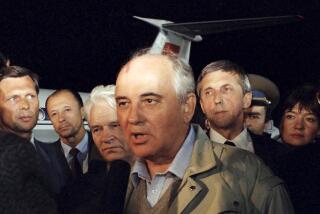Gorbachev Has Europe’s Ear : Taking the Initiative From Star Wars-Struck Administration
- Share via
HAMBURG, West Germany — Whatever else may lie behind Soviet leader Mikhail S. Gorbachev’s new arms-control plan, it has made one point painfully clear: America has lost the diplomatic initiative to the Soviet Union.
Through its insistence that President Reagan’s Strategic Defense Initiative is not negotiable, the U.S. Administration has painted itself into a corner. Now it cannot probe whether the Soviet Union is serious, which is likely, or is merely playing to the gallery of public opinion. It cannot find out what price Gorbachev is willing to pay for some stability in the arms race while he is engaged in the mammoth task of modernizing the backward Soviet economy. Nor can the Administration, even if it wanted to, design a long-term strategy of how to deal with the Soviet rival over the next decade. U.S. diplomacy is in the doldrums.
Compare this to the fresh wind from Moscow. Gorbachev, too, was in danger at some stage of getting hooked on fighting “Star Wars” and losing all diplomatic flexibility as a result. That no doubt would have been the advice of former Foreign Minister Andrei A. Gromyko. But the new Soviet leader hoisted Gromyko to the ceremonial job of state president and proceeded to the Geneva summit meeting last November despite the American refusal to budge on SDI. He even agreed to a final declaration with the President that did not mention SDI at all.
The Washington hawks were delighted about this at the time. They saw it as a clear vindication of the President’s refusal, at the fireside summit, to suggest restrictions on testing new SDI technologies. The omission in the final agreement, so the hawks argued, indicated that the Soviets did not mind the U.S. program quite as much as their public attacks had led Washington doves and European peaceniks to believe. If you only apply enough pressure, so went their advice, Moscow would give in.
Well, they have been proved wrong. One thing that Gorbachev’s latest proposal makes amply clear is that there will be no arms-control deal unless the SDI program is curtailed in one way or another. Yet, while leaving no doubt about his views on the matter, the Soviet leader has not made strategic defense the centerpiece of his diplomacy. This allows him to appear more flexible, more imaginative and more cooperative than both his Soviet predecessors and his American counterpart. That Moscow and not Washington should now be taking the initiative is a most unusual sight for the world. Although most people--in Western Europe, too--recognize that there is a strong portion of propaganda in Gorbachev’s statements, the Soviet leader is improving his image at the expense of the United States. The Kremlin is scoring more points in the public-opinion contest than is the White House.
But that is not even the most worrying effect of Moscow’s flexibility and Washington’s intransigence. More serious is the fact that the Reagan Administration, through its fixation on Star Wars, is depriving itself of the means to shape a new arms-control regime in Geneva. During the past four decades only the United States, not the Soviet Union, has been capable of developing the concepts, formulating the objectives and sketching the solutions that finally led to agreement between the two superpowers. Moscow knew when to accept a deal, but never how to construct one.
This does not seem to have changed. Gorbachev’s recent proposal removes some secondary obstacles to agreement that the Soviets had set up themselves in the past. But its core proposal remains essentially one-sided. The totally unrealistic call for removing all nuclear weapons from the face of the Earth by the end of the century indicates that Gorbachev, too, finds it difficult to resist the temptation of propaganda gimmicks. If the world is waiting for a serious Soviet plan to reduce nuclear weapons and regulate the arms race, it will have to wait for a very long time.
Sadly, however, the U.S. Administration today does not generate much hope in this respect, either. Washington seems to remain Star Wars-struck. And, while the spectacle of proposals and counterproposals from both sides will continue, a breakthrough remains unlikely. It was no doubt one intention of Gorbachev’s latest fanfare to put the blame for the stalemate in Geneva on the United States. Unfortunately, the Reagan Administration behaves as if it wants the blame to stick.
More to Read
Get the L.A. Times Politics newsletter
Deeply reported insights into legislation, politics and policy from Sacramento, Washington and beyond. In your inbox twice per week.
You may occasionally receive promotional content from the Los Angeles Times.










